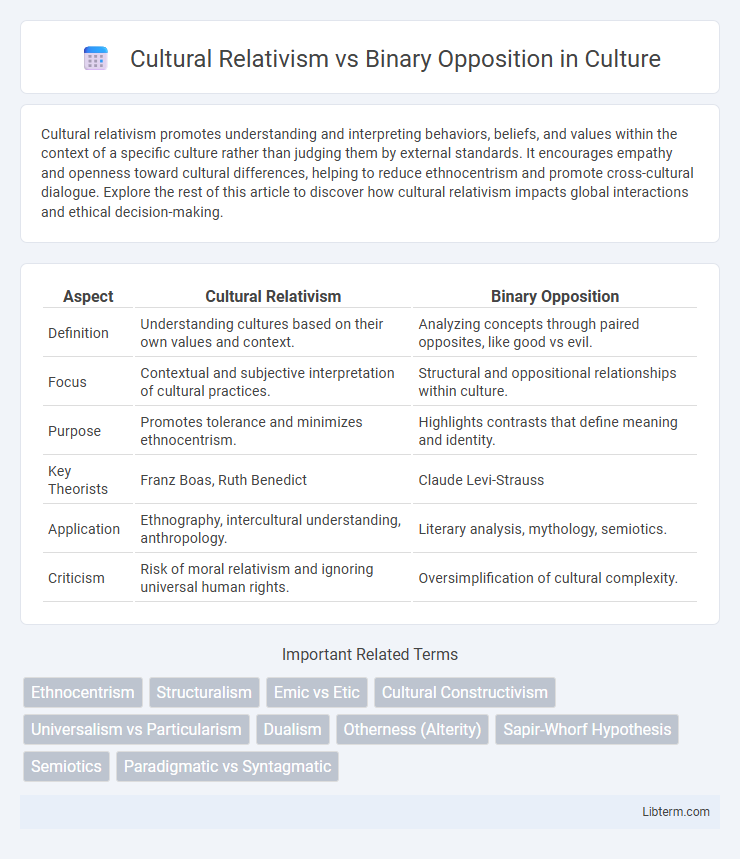Cultural relativism promotes understanding and interpreting behaviors, beliefs, and values within the context of a specific culture rather than judging them by external standards. It encourages empathy and openness toward cultural differences, helping to reduce ethnocentrism and promote cross-cultural dialogue. Explore the rest of this article to discover how cultural relativism impacts global interactions and ethical decision-making.
Table of Comparison
| Aspect | Cultural Relativism | Binary Opposition |
|---|---|---|
| Definition | Understanding cultures based on their own values and context. | Analyzing concepts through paired opposites, like good vs evil. |
| Focus | Contextual and subjective interpretation of cultural practices. | Structural and oppositional relationships within culture. |
| Purpose | Promotes tolerance and minimizes ethnocentrism. | Highlights contrasts that define meaning and identity. |
| Key Theorists | Franz Boas, Ruth Benedict | Claude Levi-Strauss |
| Application | Ethnography, intercultural understanding, anthropology. | Literary analysis, mythology, semiotics. |
| Criticism | Risk of moral relativism and ignoring universal human rights. | Oversimplification of cultural complexity. |
Understanding Cultural Relativism: Definition and Core Principles
Cultural relativism is the anthropological principle that a person's beliefs and activities should be understood based on that person's own culture, emphasizing the importance of context and avoiding ethnocentric judgments. It promotes empathy and open-mindedness, asserting that no culture is inherently superior or inferior to another. This contrasts with binary opposition, which frames cultural differences in strict, opposing categories, often overlooking the nuanced spectrum of human experiences.
Origins and Development of Binary Opposition Theory
Binary opposition theory originated in structuralist anthropology with Claude Levi-Strauss, who posited that human cultures understand the world through paired opposites such as good/evil and life/death. This framework developed further in linguistics and literary theory, emphasizing how meaning is derived from contrasting concepts within cultural narratives. In contrast to cultural relativism, which stresses understanding beliefs within their cultural context, binary opposition highlights inherent dichotomies shaping human cognition and social structures.
Key Philosophers: From Franz Boas to Claude Lévi-Strauss
Franz Boas pioneered cultural relativism by arguing that cultural practices and beliefs should be understood within their own historical and social contexts, rejecting ethnocentric judgments. Claude Levi-Strauss developed the concept of binary opposition, positing that human thought is structured through pairs of contrasting elements, which he analyzed in myths and cultural narratives. These key philosophers shaped modern anthropology by contrasting the fluid, context-dependent interpretation of culture with structuralist analyses of universal cognitive patterns.
How Cultural Relativism Shapes Anthropological Inquiry
Cultural relativism fundamentally shapes anthropological inquiry by promoting the understanding of cultures on their own terms, avoiding ethnocentric judgments and enabling researchers to interpret social practices within their unique contexts. This approach challenges binary opposition frameworks that classify cultural phenomena into rigid dichotomies, fostering more nuanced and holistic analyses of human behavior and belief systems. As a result, anthropologists prioritize cultural diversity and complexity, leading to richer ethnographic descriptions and more ethical research methodologies.
Binary Opposition in Structuralism: Meaning-Making through Contrasts
Binary opposition in structuralism serves as a fundamental mechanism for meaning-making by highlighting contrasts between paired concepts such as good/evil, light/dark, and life/death. This framework suggests that understanding arises from the relational differences rather than isolated entities, emphasizing how culture and language structure human cognition. Binary oppositions are pivotal in analyzing myths, narratives, and social norms, revealing underlying cultural codes and ideologies that shape collective interpretation.
Comparative Analysis: Cultural Relativism vs Binary Opposition
Cultural relativism emphasizes understanding beliefs and practices within their own cultural context, promoting tolerance and reducing ethnocentrism, while binary opposition categorizes concepts into contrasting pairs, often simplifying complex cultural dynamics. Comparative analysis reveals cultural relativism's strength in fostering nuanced comprehension of diversity, whereas binary opposition provides a clear but sometimes reductive framework for interpreting cultural differences. This juxtaposition highlights the importance of context-sensitive approaches over rigid dichotomies in anthropological and cultural studies.
Criticisms and Limitations of Cultural Relativism
Cultural relativism faces criticism for potentially justifying harmful practices by refusing to evaluate them against universal ethical standards, which limits its ability to address human rights violations effectively. It struggles with the problem of moral absolutism, as it can imply that all cultural norms are equally valid, hindering cross-cultural critique and reform. This relativistic stance often clashes with binary opposition frameworks that seek to establish clear distinctions between right and wrong, emphasizing the need for some level of universal judgment in ethical discussions.
Binary Opposition: Challenges and Contemporary Perspectives
Binary opposition, a foundational concept in structuralist theory, faces challenges for oversimplifying complex cultural phenomena by forcing dualistic interpretations that may ignore nuances and intersecting identities. Contemporary perspectives emphasize deconstructing binary frameworks to embrace fluidity, multiplicity, and hybrid cultural meanings, promoting a more inclusive and dynamic understanding of cultural practices. Critics argue that binary opposition can perpetuate power imbalances by privileging one term over another, urging scholars to adopt more relational and context-specific approaches.
Intersections: Points of Convergence and Divergence
Cultural relativism emphasizes understanding beliefs and practices within their own cultural context, while binary opposition frames concepts through contrasting pairs, such as good versus evil. Both approaches intersect in analyzing how societies construct meaning, yet they diverge as cultural relativism rejects universal judgments that binary oppositions often imply. The convergence lies in their role in interpreting cultural phenomena, but the divergence emerges from cultural relativism's focus on context-dependent values versus binary opposition's tendency for fixed dichotomies.
Implications for Cross-Cultural Understanding and Global Ethics
Cultural relativism promotes empathy by emphasizing that moral values and practices must be understood within their specific cultural contexts, reducing ethnocentric bias and fostering respect for diverse worldviews. In contrast, binary opposition, which categorizes concepts into mutually exclusive pairs, risks oversimplifying complex cultural realities and reinforcing stereotypes that hinder nuanced cross-cultural dialogue. Embracing cultural relativism in global ethics encourages adaptive frameworks that accommodate pluralistic moral systems, whereas reliance on binary oppositions may limit ethical consensus and impede cooperative international relations.
Cultural Relativism Infographic

 libterm.com
libterm.com